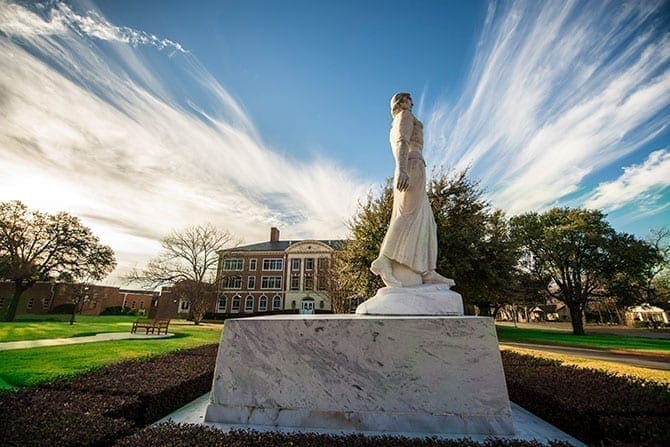In certain public colleges in the United States, students are only allowed to exercise their First Amendment rights in designated “free speech” zones. While many of these schools have recently eased these rules thanks to public pressure, Texas Woman’s University is still lagging behind.
With no plans to change their policies, at least according to campus spokesman Matt Flores, the school is now under heightened scrutiny as its Denton campus “designated free areas” were highlighted by the Foundation for Individual Rights in Education (FIRE), a campus watchdog group.

According to the organization, the Texas Woman’s University is a “yellow light institution” for restricting students’ protected expression. FIRE adds that the institution’s “ambiguous policy … easily encourages administrative abuse and arbitrary application.”
In late 2017, after neo-Nazis were spotted on the school’s Denton campus, the school was under fire for comments made by its chancellor, Carine Feyten. At the time, she said “free speech is not absolute. There are limits.”
“When free speech incites illegal activity, constitutes a ‘true threat’ that causes a person to fear imminent harm or rises to the level of prohibited harassment, it can be addressed,” Feyten added.
But what does that mean, exactly? Could she be talking about “hate speech,” and how exactly is she defining it? What kind of “illegal activity” does a certain speech have to incite to be considered a threat?
None of those questions were addressed in her note, making it difficult for any true free speech advocate to empathize with her. After all, once you use “hate speech” to keep someone from expressing their point of view, you’re picking sides — a role that a public institution should never play.
Taxpayer-Backed Institutions And Free Speech Protections
A private educational facility would have the right and power to tell its students that certain activities are not allowed on campus. But a public facility responds to taxpayers. Restricting students’ freedom of speech rights results in a violation of their commitment to following the Constitution.
Free speech zones exist now because schools wanted to contain anti-war protests in the Vietnam War era, so they created spaces where these protests could occur. However, the policy has always been unconstitutional.
As experts have explained, public schools are not required to protect people or speakers actively involved in expressing a certain viewpoint, but the moment that they start picking who can and who cannot speak freely on campus, then they are acting as political hacks or ideologues, who choose one ideology over another, effectively violating the speaker’s freedom of speech rights.
If the Texas Woman’s University does not understand that fact, it’s up to taxpayers — and students — to remind them of their duties.

























